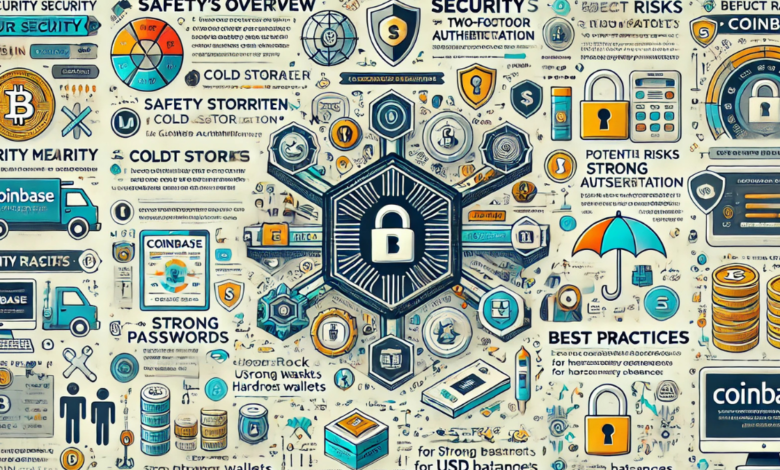Is Coinbase Safe A Comprehensive Guide to Understanding the Security of Coinbase

Cryptocurrency has revolutionized the financial Is Coinbase Safe, offering a decentralized, digital alternative to traditional banking systems. However, as more individuals venture into cryptocurrency, security concerns have grown. With high-profile breaches and scams making headlines, it’s natural for users to question the safety of their digital assets. Is Coinbase Safe, one of the most popular cryptocurrency exchanges in the world, is no exception to this scrutiny. In this article, we will explore the question: Is Coinbase safe? We will investigate its security measures, past incidents, and best practices to secure your account.
Overview of Coinbase
Is Coinbase Safe was founded in 2012 by Brian Armstrong and Fred Ehrsam to make cryptocurrency accessible to the masses. Since its inception, the platform has become one of the most trusted and widely used cryptocurrency exchanges globally. Coinbase allows users to buy, sell, and store digital currencies such as Bitcoin, Ethereum, Litecoin, etc. The platform’s user-friendly interface, educational resources, and robust mobile app have contributed to its massive success, making it a go-to choice for beginners and seasoned investors.
Is Coinbase Safe also provides a secure, user-friendly wallet to store digital assets, offering integration with hardware wallets for added security. It is available in over 100 countries and has millions of active users. The company is regulated in the United States and has received backing from reputable investors such as Andreessen Horowitz and the New York Stock Exchange. However, despite its popularity, the security question remains paramount, especially given the volatile nature of the crypto market and the constant threat of cyberattacks.
Security Measures at Coinbase
Regarding the safety of your funds on Coinbase, the platform takes a multi-layered approach to security. One of the most significant features is its use of cold storage, which ensures that most users’ funds are kept offline and out of reach of hackers. Approximately 98% of Coinbase’s cryptocurrency assets are stored in cold wallets, providing high security. These cold wallets are stored in highly secure vaults without internet access, ensuring they are not susceptible to online attacks.
In addition to cold storage, Coinbase employs various industry-standard security measures, including multi-signature wallets. This means multiple parties must sign off before any funds can be transferred, adding an extra layer of protection. Coinbase uses two-factor authentication (2FA) for account access, requiring users to enter a second code sent to their mobile device or email and their password. This reduces the chances of unauthorized access to your account.
Another crucial security feature is Coinbase’s encryption practices. All sensitive data, including private keys and user credentials, is encrypted at rest and in transit using advanced cryptographic algorithms. The platform also continuously monitors unusual activity, ensuring that suspicious transactions are flagged in real-time. Furthermore, Coinbase offers insurance on USD balances held on the platform, providing users with an added layer of financial security.
Potential Risks and Vulnerabilities
Despite its advanced security infrastructure, no platform is immune to risk. Coinbase has faced some challenges, including high-profile breaches and instances of account takeovers. In 2021, Coinbase was the victim of a phishing attack targeting users by tricking them into revealing their login credentials. While the company responded quickly to protect its users and address the issue, this incident highlighted the potential vulnerabilities inherent in cryptocurrency.
Additionally, users must be aware of third-party risks. Many users link their Coinbase account to third-party apps or APIs for trading or portfolio management. While these integrations can be convenient, they may expose your account to vulnerabilities if the third-party service is compromised. Reviewing the permissions granted to these apps and being cautious about the apps and services you connect to your Coinbase account is crucial.
One of the most significant risks users face is the threat of phishing scams. Hackers often impersonate Coinbase representatives through fake emails, websites, or support tickets, tricking users into providing sensitive information. These phishing attempts can result in unauthorized access to your account and potential loss of funds. Users need to stay vigilant and follow best practices to avoid falling victim to these scams.
While Coinbase offers robust security measures, the platform is not entirely invulnerable. The results could devastate users if a successful cyberattack ever targeted the company. It’s important to understand that Coinbase’s insurance coverage only applies to USD balances and does not extend to cryptocurrency assets stored on the platform. Therefore, users might not be fully compensated for lost digital assets if the platform were hacked.
How to Stay Safe on Coinbase

While Coinbase provides several security features, the ultimate responsibility for securing your account lies with you, the user. Here are some best practices to ensure that your Coinbase account remains safe:
- Use Strong Passwords: The first line of defense is a strong, unique password. Avoid using common passwords or reusing the same password across multiple platforms. Consider using a password manager to generate and store complex passwords securely.
- Enable Two-Factor Authentication (2FA): This extra layer of security makes it much harder for hackers to access your account. Always enable 2FA and choose the most secure option, such as using an authentication app rather than SMS-based codes, which can be vulnerable to SIM-swapping attacks.
- Beware of Phishing Scams: Always verify the authenticity of emails or messages claiming to be from Coinbase. Check the sender’s email address and look for any signs of suspicious activity. Never click on links from unknown sources or provide sensitive information through unsolicited emails.
- Use a Hardware Wallet for Long-Term Storage: While Coinbase offers secure storage for your assets, it’s always a good idea to store your long-term holdings in a hardware wallet, such as Ledger or Trezor. Hardware wallets are immune to online hacks and give you complete control over your private keys.
- Monitor Account Activity Regularly: Review your account activity for unauthorized transactions. If you notice anything suspicious, immediately contact Coinbase’s support team and take steps to secure your account.
Conclusion
In conclusion, Coinbase is a widely trusted platform with numerous security features to protect its users’ funds. While it is generally considered safe, no system is entirely risk-free, and users must take additional steps to secure their accounts. Users can significantly reduce the risks associated with cryptocurrency trading by utilizing security measures such as two-factor authentication, strong passwords, and cold storage. The platform’s insurance policy, cold storage approach, and encryption practices provide a solid foundation for security. Still, ultimately, the safety of your funds also depends on how vigilant and proactive you are in protecting your account.
FAQs
- Is Coinbase insured?
- Yes, Coinbase offers insurance coverage for USD balances held on the platform. However, this insurance does not cover cryptocurrency assets.
- Can Coinbase be hacked?
- While Coinbase employs advanced security measures, no platform is immune to hacking. However, Coinbase has a strong track record of responding quickly to incidents and protecting its users.
- How does Coinbase secure my private keys?
- Coinbase uses industry-standard encryption and stores most users’ funds in cold storage, ensuring that private keys are kept offline and out of reach of hackers.
- What should I do if I lose access to my Coinbase account?
- If you lose access to your Coinbase account, contact Coinbase support immediately and follow their account recovery process.
- Is two-factor authentication enough to secure my Coinbase account?
You May Also Read: https://latestcryptonewz.com/goo-gone/




